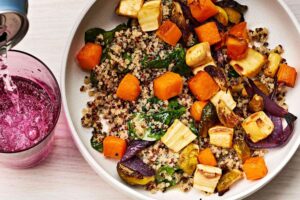Culinary experts who specialize in athlete nutrition play a vital role in enhancing performance through tailored food strategies. This article explores key nutrition tips for those aspiring to support athletes with their culinary skills. From the importance of a well-rounded breakfast to the intricacies of meal timing and the role of hydration, we’ll outline how to craft meals and snacks that meet the rigorous demands of athletic training and performance. Join us as we navigate the essentials of sports nutrition, providing practical advice to elevate the culinary game for athletes.
The Significance of Breakfast and Meal Timing

Athletes’ performance is highly influenced by their diet, and breakfast is a pivotal meal that should not be overlooked. Consuming a nutritious breakfast kick-starts metabolism and provides essential energy for the day’s activities. Skipping breakfast can lead to a deficit in necessary calories that fuel both brain and muscle function, which is detrimental to athletes who require both for high performance.
The Role of Breakfast
Breakfast sets the stage for an athlete’s energy levels and nutritional balance for the day. Sports nutrition experts must encourage athletes to prioritize this meal. A balance of carbohydrates, proteins, and fats can help sustain energy levels and optimize performance during training and competitions.
Timing Your Meals

Source: vegconomist.com
The timing of meals is another critical aspect to consider. Consuming the right foods at the right time ensures that athletes have the energy they need to perform and recover. A pre-workout meal or snack should be rich in carbohydrates to maintain blood sugar levels and provide immediate energy.
Hydration and Nutrient Replenishment
Proper hydration is just as crucial as food for athletic performance. The body’s hydration levels before, during, and after exercise can significantly impact an athlete’s efficiency and recovery. Sports nutrition experts should focus on individualized hydration strategies that match the athletes’ specific needs and activities.
Importance of Hydration

Source: nordictrack.co.uk
Staying hydrated is essential, with recommendations suggesting 1.5 to 2 cups of water every 15 minutes during exercise. For prolonged activities, including a carbohydrate solution, can help maintain energy levels. Replenishing electrolytes, such as sodium and potassium, is also vital to prevent cramping and fatigue.
Nutrient Timing Post-Exercise
After exercise, the focus should shift to recovery. Athletes need a mix of carbohydrates to replenish glycogen stores and protein to aid in muscle repair. The timing of this nutrition is critical; ideally, athletes should consume a recovery meal or snack within 30 minutes to an hour post-exercise to maximize the benefits. For those who are serious about crafting nutrition plans for athletes, consider taking the next step in your career – get certified here with a Sports Nutrition Certification to gain specialized knowledge and credibility.
Balanced Meals and Snacks

Athletes require a diverse range of nutrients to perform at their best. A sports nutrition expert’s goal is to design meal plans that provide a balance of macronutrients and micronutrients tailored to the athlete’s specific sport and individual needs.
Crafting Balanced Meals
A healthy meal for an athlete should include a variety of food groups to ensure a comprehensive intake of nutrients. For instance, dinners might include lean proteins, complex carbohydrates, and vegetables to aid in satiety and provide sustained energy.
Conclusion
By integrating these strategies, aspiring sports nutrition experts can create effective nutrition plans that enhance athletic performance and recovery, ensuring athletes are well-fueled for both training and competition.






